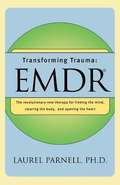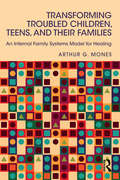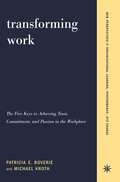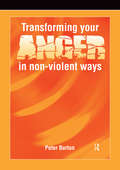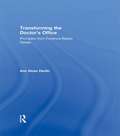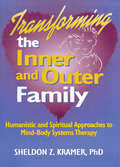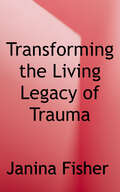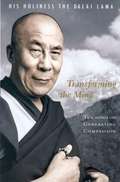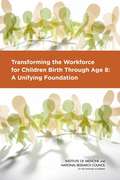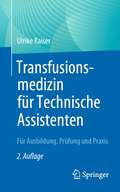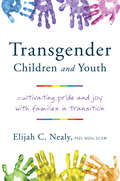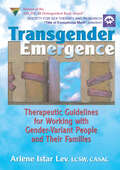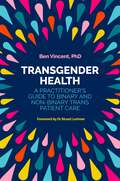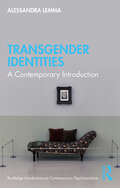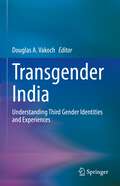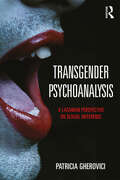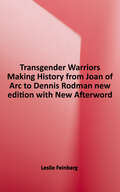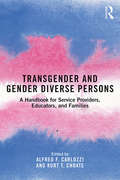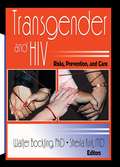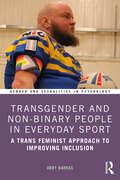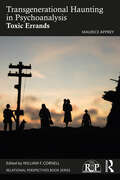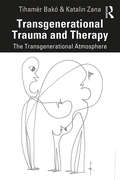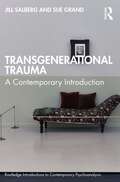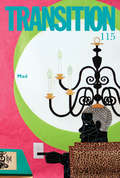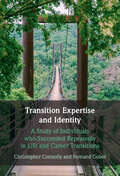- Table View
- List View
Transforming Trauma: EMDR
by Laurel ParnellEye movement desensitization and reprocessing (EMDR#65533;) has helped thousands of clients haunted by abuse histories or recent traumatic events. It also benefits patients who have not found relief with other therapies and those with chronic conditions or blocked personal and professional performance. EMDR#65533; therapy incorporates eye movements into a comprehensive approach that processes and releases information trapped in the body-mind, freeing people from disturbing images and body sensations, debilitating emotions, and restrictive beliefs. Not only does healing occur much more rapidly than in traditional therapy, but clients also experience a sense of joy, openness, and deep connection with others. EMDR#65533; seems to be a quantum leap in the human ability to heal trauma and maladaptive beliefs.
Transforming Troubled Children, Teens, and Their Families: An Internal Family Systems Model for Healing
by Arthur G. MonesIn Transforming Troubled Children, Teens, and Their Families: An Internal Family Systems Model for Healing, Dr. Mones presents the first comprehensive application of the Internal Family Systems (IFS) Therapy model for work with youngsters and their families. This model centers diagnosis and treatment around the concept of the Functional Hypothesis, which views symptoms as adaptive and survivalbased when viewed in multiple contexts. The book provides a map to help clinicians understand a child’s problems amidst the reactivity of parents and siblings, and to formulate effective treatment strategies that flow directly from this understanding. This is a nonpathologizing systems and contextual approach that brings forward the natural healing capacity within clients. Dr. Mones also shows how a therapist can open the emotional system of a family so that parents can let go of their agendas with their children and interact in a loving, healthy, Self-led way. This integrative MetaModel combines wisdom from Psychodynamic, Structural, Bowenian, Strategic, Sensorimotor, and Solution-Focused models interwoven with IFS Therapy. A glossary of terms is provided to help readers with concepts unique to IFS. Unique to this approach is the emphasis on shifting back and forth between intrapsychic and relational levels of experience. Therapy vignettes are explored to help therapists address issues such as trauma, anxiety, depression, somatization, oppositional and self-destructive behavior in children, along with undercurrents of attachment injury. Two detailed cases are followed over a full course of treatment. A section on Frequently Asked Questions explores work with families of separation and divorce, resistance, the trajectory of treatment, dealing with anger, linking to twelve-step programs, and much more. This is an ideal book for any therapist in quest of understanding the essence of healing and seeking therapeutic strategies applied within a compassionate framework.
Transforming Work: The Five Keys to Achieving Trust, Commitment, and Passion in the Workplace
by Patricia E. Boverie Michael KrothIn this age of stiff competition and free agency, no organization can afford to take its employees for granted. The new labor-market landscape is forcing organizations to think creatively about how
Transforming Your Anger in Non-Violent Ways
by Peter BurtonThis is a practical workbook helping individuals to safely express their anger. For those of you who are struggling with unhelpful expressions of anger, whether your own or other people's, this book provides explanations, activities and exercises to change how you understand and express your anger. It empowers you to move away from your habitual reactions, resulting in conflict, and towards ways of expressing your anger fully and safely in non-violent ways. It explains key concepts and common human experiences of the physical, neurological and emotional displays of anger. It helps readers to identify the key triggers for their own and others' anger, and to identify their typical anger style. It describes non-violent ways to express anger fully and safely, and to receive and deal with the anger of others. It explains how changes to behaviour can be established and maintained. With more than 40 activities and exercises to work through, this is a practical resource to empower you to change your behaviour so you are able to express your anger safely and to improve your experience of family and work life.
Transforming the Doctor's Office: Principles from Evidence-based Design
by Ann Sloan DevlinFrom the parking lot to the exam room, doctors can improve the physical surroundings for their patients, yet often they do not. Given the numerous and varied duties doctors must perform, it may fall to the design profession to implement changes, many based on research, to improve healthcare experiences. From location and layout to furnishings and positive distractions, this book provides evidence-based information about the physical environment to help doctors and those who design medical workspaces improve the experience of health care. Along with its research base, a special aspect of this book is the integration of relevant historical material about the office practice of physicians at the beginning of the twentieth century. Many of their design solutions are viable today. In addition to improving the physical design of healthcare facilities, author Ann Sloan Devlin is the granddaughter, daughter, and niece of physicians, as well as the granddaughter and daughter of nurses. She worked in a hospital during college, and has visited a good many practitioners’ offices in medical office buildings and ambulatory care settings. This book addresses an overlooked location of care: the doctor’s office suite.
Transforming the Inner and Outer Family: Humanistic and Spiritual Approaches to Mind-Body Systems Therapy
by E Mark Stern Sheldon Z KramerThis enlightening book integrates humanistic and transpersonal psychotherapy principles with family systems work. Transforming the Inner and Outer Family discusses a wide range of creative methodologies, such as the use of meditation, guided imagery, and energy centers in the body to bridge the inner and outer experiences of the individual and family members. Chapters explore the healing capacity of intense affect to unify significant others through the transformation of fear, anger, and grief to understanding, compassion, love, and forgiveness. The book is practical as well as theoretical, containing many case studies focusing on individual, couples, and family therapy. In addition, a special chapter is included on the use of family of origin sessions. Transcripts of actual cases show detailed methods of entering into the therapy system to promote change and demonstrate the operational definition of spirituality and its practical utilization in psychotherapy. Also included is a special candid interview between the author and Virginia Satir, mother of family therapy, nine months before she died, on her personal and professional life.Transforming the Inner and Outer Family presents an integrative family systems model that emphasizes the coordination of existential, humanistic, and transpersonal healing psychologies. This model coordinates Virginia Satir’s later thinking with Roberto Assagioli’s model of psychosynthesis. Author Sheldon Kramer blends principles of psychosynthesis with family systems work and thoroughly explains the use of his new model, Mind-Body Systems Therapy,™ including: development of internal family configurations the spiritual dimension within the systemic context integrating the use of the body with meditation in healing practices methods of healing the inner nuclear and intra-generational family bridging the inner and outer familial world stages of inner and outer healing the use of self in therapyTransforming the Inner and Outer Family is on the cutting edge of current emerging interests in alternative medicine, especially in holistic principles of healing, with emphasis on the spiritual dimension as a major healing conduit for transformation. Readers will discover in this book a solid theoretical base that integrates traditional psychology, including psychodynamic/object relations theory, with less-mainstream forms of psychotherapy, and will learn effective strategies for helping individuals, couples, and families heal.
Transforming the Living Legacy of Trauma: A Workbook for Survivors and Therapists
by Janina FisherTraumatic experiences leave a “living legacy” of effects that often persist for years and decades after the events are over. Historically, it has always been assumed that re-telling the story of what happened would resolve these effects. However, survivors report a different experience: Telling and re-telling the story of what happened to them often reactivates their trauma responses, overwhelming them rather than resolving the trauma. To transform traumatic experiences, survivors need to understand their symptoms and reactions as normal responses to abnormal events. They need ways to work with the symptoms that intrude on their daily activities, preventing a life beyond trauma.
Transforming the Mind: Teachings on Generating Compassion
by Dalai LamaIn his commentary on the Verses, His Holiness shows us how to cultivate wisdom and compassion in our daily lives. In particular, he teaches us how to think more positively and explains techniques to transform adverse situations into opportunities for spiritual growth. He shows us, by training and transforming our own mind, how we can effect changes in our own life and the lives of those around us.
Transforming the Workforce for Children Birth Through Age 8: A Unifying Foundation
by Larue AllenChildren are already learning at birth, and they develop and learn at a rapid pace in their early years. This provides a critical foundation for lifelong progress, and the adults who provide for the care and the education of young children bear a great responsibility for their health, development, and learning. Despite the fact that they share the same objective - to nurture young children and secure their future success - the various practitioners who contribute to the care and the education of children from birth through age 8 are not acknowledged as a workforce unified by the common knowledge and competencies needed to do their jobs well. "Transforming the Workforce for Children Birth Through Age 8" explores the science of child development, particularly looking at implications for the professionals who work with children. This report examines the current capacities and practices of the workforce, the settings in which they work, the policies and infrastructure that set qualifications and provide professional learning, and the government agencies and other funders who support and oversee these systems. This book then makes recommendations to improve the quality of professional practice and the practice environment for care and education professionals. These detailed recommendations create a blueprint for action that builds on a unifying foundation of child development and early learning, shared knowledge and competencies for care and education professionals, and principles for effective professional learning. Young children thrive and learn best when they have secure, positive relationships with adults who are knowledgeable about how to support their development and learning and are responsive to their individual progress. "Transforming the Workforce for Children Birth Through Age 8" offers guidance on system changes to improve the quality of professional practice, specific actions to improve professional learning systems and workforce development, and research to continue to build the knowledge base in ways that will directly advance and inform future actions. The recommendations of this book provide an opportunity to improve the quality of the care and the education that children receive, and ultimately improve outcomes for children.
Transfusionsmedizin für Technische Assistenten: Für Ausbildung, Prüfung und Praxis
by Ulrike KaiserIn dem vorliegenden Werk findet sich das Wesentliche zur Transfusionsmedizin und Immunhämatologie - leicht verständlich, sehr übersichtlich und mit vielen wertvollen Tipps aus der Praxis, speziell zugeschnitten auf die Bedürfnisse von MTAs, wie MTLAs, MTRAs, MTAFs sowie CTAs und BTAs. Dargestellt werden u.a. die Blutgruppensysteme, Testverfahren, Blutprodukte sowie unerwünschte Wirkungen, Nebenwirkungen und Komplikationen der Transfusion. Das Werk eignet sich hervorragend als Begleitbuch im Rahmen der Ausbildung und zur Vorbereitung auf die Prüfung sowie für den schnellen Überblick im Berufsalltag. Die 2. Auflage erscheint aktualisiert.
Transgender Children and Youth: Cultivating Pride and Joy with Families in Transition
by Elijah C. NealyA comprehensive guide to the medical, emotional, and social issues of trans kids. These days, it is practically impossible not to hear about some aspect of transgender life. Whether it is the bathroom issue in North Carolina, trans people in the military, or on television, trans life has become front and center after years of marginalization. And kids are coming out as trans at younger and younger ages, which is a good thing for them. But what written resources are available to parents, teachers, and mental health professionals who need to support these children? Elijah C. Nealy, a therapist and former deputy executive director of New York City’s LGBT Community Center, and himself a trans man, has written the first-ever comprehensive guide to understanding, supporting, and welcoming trans kids. Covering everything from family life to school and mental health issues, as well as the physical, social, and emotional aspects of transition, this book is full of best practices to support trans kids.
Transgender Emergence: Therapeutic Guidelines for Working with Gender-Variant People and Their Families
by Arlene Istar LevExplore an ecological strength-based framework for the treatment of gender-variant clients This comprehensive book provides you with a clinical and theoretical overview of the issues facing transgendered/transsexual people and their families. Transgender Emergence: Therapeutic Guidelines for Working with Gender-Variant People and Their Families views assessment and treatment through a nonpathologizing lens that honors human diversity and acknowledges the role of oppression in the developmental process of gender identity formation. Specific sections of Transgender Emergence: Therapeutic Guidelines for Working with Gender-Variant People and Their Families address the needs of gender-variant people as well as transgender children and youth. The issues facing gender-variant populations who have not been the focus of clinical care, such as intersexed people, female-to-male transgendered people, and those who identify as bigendered, are also addressed. The book examines: the six stages of transgender emergence coming out transgendered as a normative process of gender identity development thinking "outside the box" in the deconstruction of sex and gender the difference between sexual orientation and gender identity, as well as the convergence, overlap, and integration of these parts of the self the power of personal narrative in gender identity development etiology and typographies of transgenderism treatment models that emerge from various clinical perspectives alternative treatment modalities based on gender variance as a normative lifecycle developmental process Complete with fascinating case studies, a critique of diagnostic processes, treatment recommendations, and a helpful glossary of relevant terms, this book is an essential reference for anyone who works with gender-variant people. Handy tables and figures make the information easier to access and understand.Visit the author's Web site at http://www.choicesconsulting.com
Transgender Health: A Practitioner's Guide to Binary and Non-Binary Trans Patient Care
by Benjamin Vincent Dr Stuart LorimerThe number of people coming out as transgender continues to rise, and this book shows healthcare and medical practitioners how to deliver excellent primary and secondary care to gender diverse patients. This guide provides accessible and practical advice on tailoring the social and ethical aspects of practice to the needs of each individual. Beyond setting out how clinical procedures should work for gender reassignment, it explains how to use language and pronouns in a respectful way, provides information on transgender services and resources, and offers insights into the challenges commonly faced by transgender people in both medical and social contexts. Based on cutting edge research and the lived experience of the author as a non-binary person, this is essential reading for all those working to meet the needs of transgender people in healthcare settings.
Transgender Identities: A Contemporary Introduction (Routledge Introductions to Contemporary Psychoanalysis)
by Alessandra LemmaThis important new book by Alessandra Lemma provides a succinct overview of psychoanalytic understandings, approaches and controversies around transgender identifications. Illustrated with case vignettes, Lemma provides an up-to-date synthesis of current research and a critical overview of psychoanalytic approaches to transgender identities, distilling some of the contemporary controversies about how to approach the topic in the consulting room. Lemma also outlines a psychoanalytically informed ethical framework to support clinicians working with individuals who request medical transitioning and distils the ethical challenges faced by clinicians in light of the current emphasis on gender affirmative care. Part of the Routledge Introductions to Contemporary Psychoanalysis series, this book is of great importance for psychoanalysts in practice, academics and all those with an interest in transgender identities and mental health.
Transgender India: Understanding Third Gender Identities and Experiences
by Douglas A. VakochTransgender India: Understanding Third Gender Identities and Experiences provides the first scholarly study of hijras, transmen, and other third gender Indians from the perspective of a range of disciplines in the behavioral and social sciences, as well as the humanities. This book fosters a dialogue across academic fields, as authors cross-reference each other’s chapters, comparing and contrasting their views of transgender experience and identity in India. This multidisciplinary approach helps readers understand the complex interplay of factors that have led to discrimination against third gender individuals, as well as paths forward to a more equitable and just future, in ways that go beyond the perspective of a single academic field. This multidisciplinary approach is the book’s most distinctive feature in comparison to existing works limited to individual fields such as anthropology, investigative journalism, and history. The broad scope of Transgender India is relevant to scholars and students in diverse disciplines who seek a greater and more nuanced understanding of the behavioral and societal impact of these issues.
Transgender Psychoanalysis: A Lacanian Perspective on Sexual Difference
by Patricia GheroviciDrawing on the author’s clinical work with gender-variant patients, Transgender Psychoanalysis: A Lacanian Perspective on Sexual Difference argues for a depathologizing of the transgender experience, while offering an original analysis of sexual difference. We are living in a "trans" moment that has become the next civil rights frontier. By?unfixing our notions of gender, sex, and sexual identity, challenging normativity and essentialisms, trans modalities of embodiment can help reorient psychoanalytic practice.? This book addresses sexual identity and sexuality by articulating new ideas on the complex relationship of the body to the psyche, the precariousness of gender, the instability of the male/female opposition, identity construction, uncertainties about sexual choice—in short, the conundrum of sexual difference. Transgender Psychoanalysis?features explications of Lacanian psychoanalysis along with considerations on sex and gender in the form of clinical vignettes from Patricia Gherovici's practice as a psychoanalyst. The book engages with popular culture and psychoanalytic literature (including Jacques Lacan’s treatments of two transgender patients), and implements close readings uncovering a new ethics of sexual difference.? These explorations have important implications not just for clinicians in psychoanalysis and mental health practitioners but also for transgender theorists and activists, transgender people, and professionals in the trans field. Transgender Psychoanalysis promises to enrich ongoing discourses on gender, sexuality, and identity.
Transgender Warriors: Making History from Joan of Arc to Dennis Rodman
by Leslie FeinbergTransgender rights activist Feinberg presents evidence that there have been people throughout history who defy cultural boundaries of sex and gender and urges us to recognize them as warriors and visionaries. The coverage actually extends back to the mythology of several cultures. Highly illustrated in black and white.
Transgender and Gender Diverse Persons: A Handbook for Service Providers, Educators, and Families
by Alfred F. Carlozzi Kurt T. ChoateTransgender and Gender Diverse Persons offers mental health professionals and other caregivers information and best practices for working with transgender and gender diverse persons and their families. In each chapter, experts from a variety of fields provide an accessible introduction to medical, legal, educational, and spiritual care for transgender and gender diverse adults and youth within a range of contexts, including communities and schools in urban and non-urban settings. Appendices include helpful suggestions for online resources, as well as additional reading for practitioners, clients, and their families. With rich examples and personal narratives woven throughout, this is an essential reference for mental health professionals, as well as other service providers, educators, and family members seeking to address the needs of transgender and gender diverse persons in an up-to-date, inclusive manner.
Transgender and HIV: Risks, Prevention, and Care
by Edmond J Coleman Walter O Bockting Sheila KirkDeliver effective services to this growing population! This volume presents the first collection of reports on the impact of HIV/AIDS on the transgender community worldwide. It includes a thorough description of the unique HIV risks of transgender people and exposes their largely neglected health and social service needs. This unique book also reports on the first generation of prevention interventions targeting this community, discusses guidelines for providing sex reassignment services to HIV-positive transsexuals, and encourages collaboration between communities at risk, researchers, and people in the helping professions.The social stigma faced by this population adds to their risk of HIV infection. Low self-esteem, rejection, neglect, employment discrimination, disenfranchisement, and a desire for acceptance and validation are all contributing factors. Yet, as the editors point out, “On the positive side, the transgender community has been able to mobilize and empower itself, and has found a voice that no longer can be ignored. We call on transgender and nontransgender people alike to work together to advance HIV prevention and promote our sexual health.”In Transgender and HIV you'll encounter: extensive discussions of the health, social service, and HIV prevention needs of the transgender community tips on how to work with marginalized communities in an empowering way explorations of the sexuality of both male-to-female and female-to-male transsexuals first-ever findings on sex reassignment surgery on HIV-positive individuals guidelines for surgery on HIV-positive transsexualsTransgender and HIV provides much-needed and often-requested information on HIV prevalence, risks, prevention, and care for this increasingly visible community.
Transgender and Non-Binary People in Everyday Sport: A Trans Feminist Approach to Improving Inclusion (Gender and Sexualities in Psychology)
by Abby BarrasThis formative work discusses transgender people’s inclusion in everyday sport in the United Kingdom. It adopts a trans feminist approach to explore pivotal issues regarding the barriers to participation faced by transgender and non-binary people.Offering a critical perspective on the current landscape surrounding this topic, the book draws from insightful interviews conducted by the author with 18 transgender and non-binary individuals. The author uses a critical social science approach to explore the heteropatriarchal construction of sport in the modern industrialised West, and how this has formed the backdrop to the continuing discrimination towards many athletes, not just those who are transgender. Using first-hand perspectives, it focuses on the three themes of the sporting body, sporting spaces and sporting communities. It investigates why conversations about fairness and safety regarding transgender athletes have become so polarised within the media, and the significance of taking a trans feminist approach to reducing barriers in sport. Lastly, the book’s key findings initiate a dialogue on the importance of gender affirmation in sport, the value of supportive teammates/role models and how sporting spaces can be reimagined to promote greater inclusion for all.Transgender and Non-Binary People in Everyday Sport is a crucial resource for researchers, academics, and students in the field of social science, sports organisations, policy makers, third-sector organisations, activists and other related disciplines. The book will also be a compelling read for anyone with an interest in improving inclusion for transgender and non-binary people in everyday sport and wants to learn more about how trans feminism can achieve this.
Transgenerational Haunting in Psychoanalysis: Toxic Errands (Relational Perspectives Book Series)
by Maurice AppreyIn this book, Maurice Apprey continues his unique work on transgenerational haunting to explore how events in our ancestors' lives may be renegotiated and re-subjectivized in the present from within the therapeutic dyad. With an informed and impassioned voice that evokes the tragic psychic consequences of the unresolved, silenced tragedies and transgressions that haunt subsequent generations, Apprey illustrates how the analyst can unfold a patient's transference wishes and emancipate them from the unconscious projects, or errands, they have inherited. This can happen through a threefold process of excavating the unconscious sedimentations of ancestral history, appropriating and reactivating the ancestral errands within the transference, and subsequently decoding the patient's transference pressures. Expanding on Apprey's work about the analyst's field of inquiry and ways of listening in clinical practice, this book illuminates the potential for a resolution, rather than a re-enactment, of the traumas that can haunt a family system across generations. Attending to the manifestation of transgenerational trauma through varied clinical material, and informed by the thinking of Sigmund Freud, among others, this book will be essential reading for all psychoanalysts and psychotherapists.
Transgenerational Trauma and Therapy: The Transgenerational Atmosphere
by Tihamér Bakó Katalin ZanaTransgenerational Trauma and Therapy presents the transgenerational, psychological impacts of trauma, and the clinical work on it. The book's expansive insight explores the psychology of the massive, collective trauma, and provides new ways of understanding the serious after-effects of man-made suffering. In this book, Bakó and Zana employ their original concept, "the transgenerational atmosphere", to fully comprehend many familiar phenomena in a new theoretical framework, exploring the psychological impact of trauma on the first generation, the mode of transmission, the effects on future generations, and therapeutic considerations. Crucially, Transgenerational Trauma and Therapy explores the psychological effects of collective, societal traumas on whole groups of individuals. Beginning with the direct, deep psychological effects of individual trauma, and then exploring the impact of collective trauma over generations , it deals particularly with the role of the social environment in the processing of trauma, as well as its hereditary transmission. Rich in clinical material and methodological suggestions, Transgenerational Trauma and Therapy will appeal to mental health professionals, including psychiatrists, psychologists, psychoanalysts, and social workers, in addition to professors in other academic disciplines, such as sociology, history, philosophy, and anthropology.
Transgenerational Trauma: A Contemporary Introduction (Routledge Introductions to Contemporary Psychoanalysis)
by Sue Grand Jill SalbergIn this book, Jill Salberg and Sue Grand offer an overview of the psychoanalytic work on transgenerational trauma, rooting their perspective in attachment theory, and the social-ethical turn of Relational psychoanalysis.Transgenerational Trauma: A Contemporary Introduction is a cutting-edge study of trauma transmission across generations. Salberg and Grand consider how our forebears' trauma can leave a scar on our lives, our bodies, and on our world. They posit that, too often, we re-cycle the social violence that we were subjected to. Their unique approach embraces diverse psychoanalytic and psychodynamic theories, as they look at attachment, legacies of violence, and the role of witnessing in healing. Clinical and personal stories are interwoven with theory to elucidate the socio-historical positions that we inherit and live out. Social justice concerns are addressed throughout, in a mission to heal both individual and collective wounds.Transgenerational Trauma: A Contemporary Introduction offers a nuanced and comprehensive approach to this vital topic, and will be of interest to psychoanalysts, psychologists and other mental health professionals, as well as students and scholars of trauma studies, race and gender studies, sociology, conflict resolution, and others.
Transition Expertise and Identity: A Study of Individuals Who Succeeded Repeatedly in Life and Career Transitions
by Fernand Gobet Christopher ConnollyThrough a systematic review of relevant literature and an analysis of in-depth interviews with key expert performers, this book examines the nature of expertise that enables individuals to make repeated successful transitions over the course of their career. Focusing on business, sports, and music, it examines the roles of motivation, cognitive flexibility, personal intelligence, generative thinking, and contextual intelligence in this process. It further shows how identity changes and adapts during a career transition and how self concept evolves over the course of a career. This book has wide appeal for academics in psychology, sports, music, and business, as well as coaches, mentors, talent management, and training organisations across these domains.
